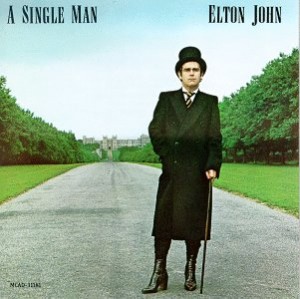
For The First Time, Elton Recorded An Album Without The Help Of His Life-long Collaborator Bernie Taupin
A Single Man was issued in 1978, two years after Elton had announced his first retirement.
The title of this album should be taken almost literally – Elton had sacked not only his entire backing band, but also his loyal lyricist Bernie Taupin. For a couple of albums, that crucial chair was to be occupied by Gary Osborne (one former half of Vigrass & Osborne, the duo that came up with the original version of “Forever Autumn”).
Technically, I find Osborne more interesting than Bernie – he has a firmer grasp on complex rhyme schemes (“Madness”), and alliterates purposefully (“Shine On Through”). In terms of content, now, his songs can be even more misguided and clueless than Taupin’s when he is not careful. You have two glaring examples here: the single “Part Time Love” (banned on some territories such as Russia on grounds of condoning underage sex) and the plain silly and puerile “Big Diper”.
On the contrary, the songs in which Osborne bites the bullet and ventures on his own instead of referencing Taupin are mostly tasteful. “Madness” is a good example, and the first truly good song that he and Elton crafted together. An anti-war protest, “Madness” is the sole foot-stomper of the whole album, and one of the songs that sticks for everybody.
The other is the aforementioned “Part Time Love”. Leaving aside the unfortunate lyrics, the song combines one of Elton’s most fluid melodies in years with one of Paul Buckmaster’s most grandiloquent orchestrations. Note that “A Single Man” was to stand as Buckmaster’s final collaboration with Elton for over a decade – they reunited for the “Made In England” album in 1995, when Elton was sold as an adult entertainer on the strength of “The Lion King” OST.
And the album also has some shades of that stylistic diversity that defined the most emblematic works of Elton during the previous decade. There is gospel on “Georgia” and some Latin percussion on “Return To Paradise” (a song which could have been way better – it ends up sounding too saturated for its own good). And “It Ain’t Gonna Be Easy” is a blues number that actually works, although not necessarily owing to Elton’s contribution – it is guitar player Tim Renwick who provides the song’s most memorable passages, aided by another fine arrangement by Buckmaster.
The album is also notable for having yielded Elton’s one and only instrumental hit to date – “Song For Guy” was a top ten hit all over Europe. (It failed to chart in the US, though.)
“A Single Man” is not really a bad album. It was seen as a letdown when it was originally issued because it was clearly inferior to the albums that had preceded it. The songs I did not mention or describe in any particular length above are unremarkable, even when most of the ballads (especially “Shine On Through”, the set opener) warrant more than a good couple of listens.
When all is said and done, the perspective we have today of Elton’s career necessarily makes us place some sort of positive value on this album. And we have to conclude that it isn’t half bad. Even if it just doesn’t go into any unchartered territory, Elton’s playing and singing are consistently good. And while half the album is not that memorable, the songs are far removed from things like “I Am Your Robot“, “Ball & Chain” and “Don’t Trust That Woman“. And that’s worthy of a sigh of relief indeed.

Pingback: What Is The True Story Behind Elton John’s “Song For Guy”? Who Was It About? | MusicKO